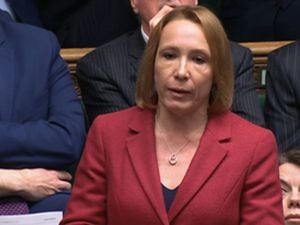P8 Thursday
Amid the smoking ruins of Carillion, Theresa May emerged swinging her handbag in the direction of Jeremy Corbyn.
As thousands face uncertainty about their jobs, their pay, their payments, their apprenticeships, and their pensions, the matter was discussed in the House of Commons with all the decorum of an end-of-pier Punch and Judy show in front of a baying pack of MPs.
However, beyond the attempts at political point-scoring on both sides, there was at least a level of reassurance from Mrs May.
"I want to provide reassurance to all employees who are working on public services for Carillion that they should continue to turn up to work confident in the knowledge that they will be paid for the work they are providing," she told Labour's Catherine McKinnell, in the very first question of Prime Minister's Questions, before adding pointedly: "But of course the government is not running Carillion. The government is actually a customer of Carillion."
We're not to blame, in other words. You can't pin this one on us.
Nevertheless, Jeremy Corbyn had a real go. The government could see it coming, and the outcome was due to its negligence and lack of oversight, he argued.
Despite clear signs of trouble in the Carillion stable, with profit warnings and a share price in freefall, the government had awarded the firm contracts worth over £2 billion in the last six months, he said.
At this Mrs May adopted the tone of a teacher dealing with a pupil of incompletely developed intellectual faculties.
If the government or private sector companies pulled out of contracts every time there was a profit warning, she told him, it would be the best way to ensure that those companies failed and that jobs were lost, and would also throw up issues about continuing uninterrupted public services.
And not for the first time, the Prime Minister turned to Wales to help her. Famously, she was walking in Snowdonia when she decided to call the last general election. The Welsh effect did not do the trick then. But when she finds herself in a sticky political spot, she often finds it useful to invoke the Welsh government - the Labour-run Welsh government.
The comrades of Mr Corbyn who are turning Wales into a socialist paradise had issued a contract after Carillion's profit warning last July. Only last week, Labour-run Leeds City Council had declared Carillion was its preferred bidder.
She even threw in that the Shadow Foreign Secretary, Emily Thornberry, had praised Carillion in the past. At this Emily Thornberry looked bemused. She will probably be issuing an official denial.
Jeremy responded with another attack. Mrs May: "I'm happy to answer questions when the Right Honourable Gentleman asks one. He didn't."
"I asked the government if they had been negligent or not. And they clearly have been very negligent," said Mr Corbyn.
Hold on. So he's asking a question - and already has the answer to his own satisfaction?
The real answer is of course that there was something politically deeper at work in the exchanges.
Mr Corbyn's line of questioning was like a journey leading to the preferred solution under modern Labour's leadership - state ownership.
As the company was heading for failure, it was paying out increasing shareholder dividends and wildly excessive bonuses to directors. While 8,000 Carillion workers on private sector contracts would no longer be paid, the chief executive would be paid for another 10 months, he said.
"One rule for the super rich, another for everybody else."
It was important, said Mrs May, that the government had protected taxpayers from an unacceptable bailout of a private company.
Now what could she have meant by that? Surely she was not having a dig at the Darling-Brown bailout of the banks?
Mr Corbyn reached the climax of his argument.
"It's a broken system," he said, citing various other corporate failures under the Tories.
"These corporations need to be shown the door. We need our public services provided by public employees with a public service ethos and a strong public oversight.
"As the ruins of Carillion lie around her, will the Prime Minister act to end this costly racket of the relationship between the government and some of these companies?"
A third of the Carillion contracts with the government were let by the Labour government, responded Mrs May.
"The Shadow Chancellor calls businesses the real enemy," she said.
"This is a Labour Party that has turned its back on investment, on growth, and jobs. A Labour Party that will always put politics before people."
Well, the people did get mentioned at PMQs. But it was mostly politics.





